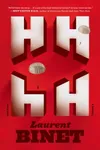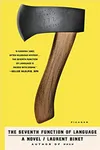Picture a French storyteller who turned history into a thrilling, mind-bending adventure—meet Laurent Binet! Born in Paris in 1972, Binet is a literary innovator whose novels blend meticulous historical research with playful metafiction, challenging how we think about the past. His breakout work, HHhH, took the world by storm, earning him the prestigious Prix Goncourt du Premier Roman and cementing his place as a bold voice in modern literature.
With a knack for weaving fact and fiction, Binet doesn’t just tell stories—he dissects the art of storytelling itself, inviting readers to question what’s real and what’s crafted. From World War II heroics to French political campaigns, his works are as thought-provoking as they are entertaining.
The Making of Laurent Binet
Born to a historian father and a mother who met in Paris’s communist circles, Laurent Binet grew up steeped in history and ideas. He studied literature at the University of Paris, later teaching French in the suburbs and at the University of Saint-Denis. Before writing, Binet rocked the stage as a singer-songwriter for the band Stalingrad and even taught French at a Slovakian military academy during his national service. These eclectic experiences shaped his unique perspective, blending academic rigor with a creative spark.
His early works, like the surreal Forces et faiblesses de nos muqueuses (2000) and the teaching memoir La Vie professionnelle de Laurent B. (2004), hinted at his experimental streak. But it was his dive into historical fiction that truly defined his career, driven by a fascination with how stories shape our understanding of the past.
Laurent Binet’s Unforgettable Stories
Binet’s debut novel, HHhH (2010), is a tour de force that recounts the 1942 assassination of Nazi leader Reinhard Heydrich. Short for “Himmlers Hirn heisst Heydrich” (“Himmler’s brain is called Heydrich”), the novel blends gripping historical detail with Binet’s own reflections on writing truth versus fiction. Its innovative style and emotional depth won the Prix Goncourt du Premier Roman and inspired a 2016 film.
In 2012, Binet switched gears with Rien ne se passe comme prévu (“Nothing Goes as Planned”), a lively behind-the-scenes account of François Hollande’s presidential campaign. Embedded with Hollande’s team, Binet captured the chaos and quirks of French politics. His 2015 novel, The Seventh Function of Language, is a witty, fictional murder mystery about the death of philosopher Roland Barthes, featuring intellectual giants like Michel Foucault and Umberto Eco. Finally, Civilizations (2019) flips history on its head, imagining Incas conquering Europe—a bold, bestselling counterfactual that won the Grand Prix de l’Académie Française.
Binet’s style is a dance between fact and imagination. His metafictional approach—where he often interrupts the narrative to question his own process—makes his work feel alive, urging readers to think critically about history and storytelling. Whether tackling war, politics, or philosophy, Binet’s novels are cerebral yet accessible, blending humor, suspense, and insight.
Why Laurent Binet Matters
Laurent Binet has redefined historical fiction by refusing to let history feel distant or static. His novels don’t just recount events—they interrogate how we remember them, making readers active participants in the narrative. By blending postmodern playfulness with deep respect for historical truth, Binet has inspired writers and readers to rethink the boundaries of fiction and reality.
His international acclaim, from France to the U.S., highlights his universal appeal. Works like HHhH and Civilizations have sparked discussions about memory, power, and the stories we tell ourselves, cementing Binet’s legacy as a literary provocateur who makes history feel urgent and alive.
- About Laurent Binet
- Born: July 19, 1972, in Paris, France
- Key Works: HHhH, The Seventh Function of Language, Civilizations
- Awards: Prix Goncourt du Premier Roman (2010), Grand Prix de l’Académie Française (2019)
- Fun Fact: Once fronted a rock band called Stalingrad
Snag HHhH or Civilizations and dive into Laurent Binet’s thrilling, brainy world of historical fiction!


